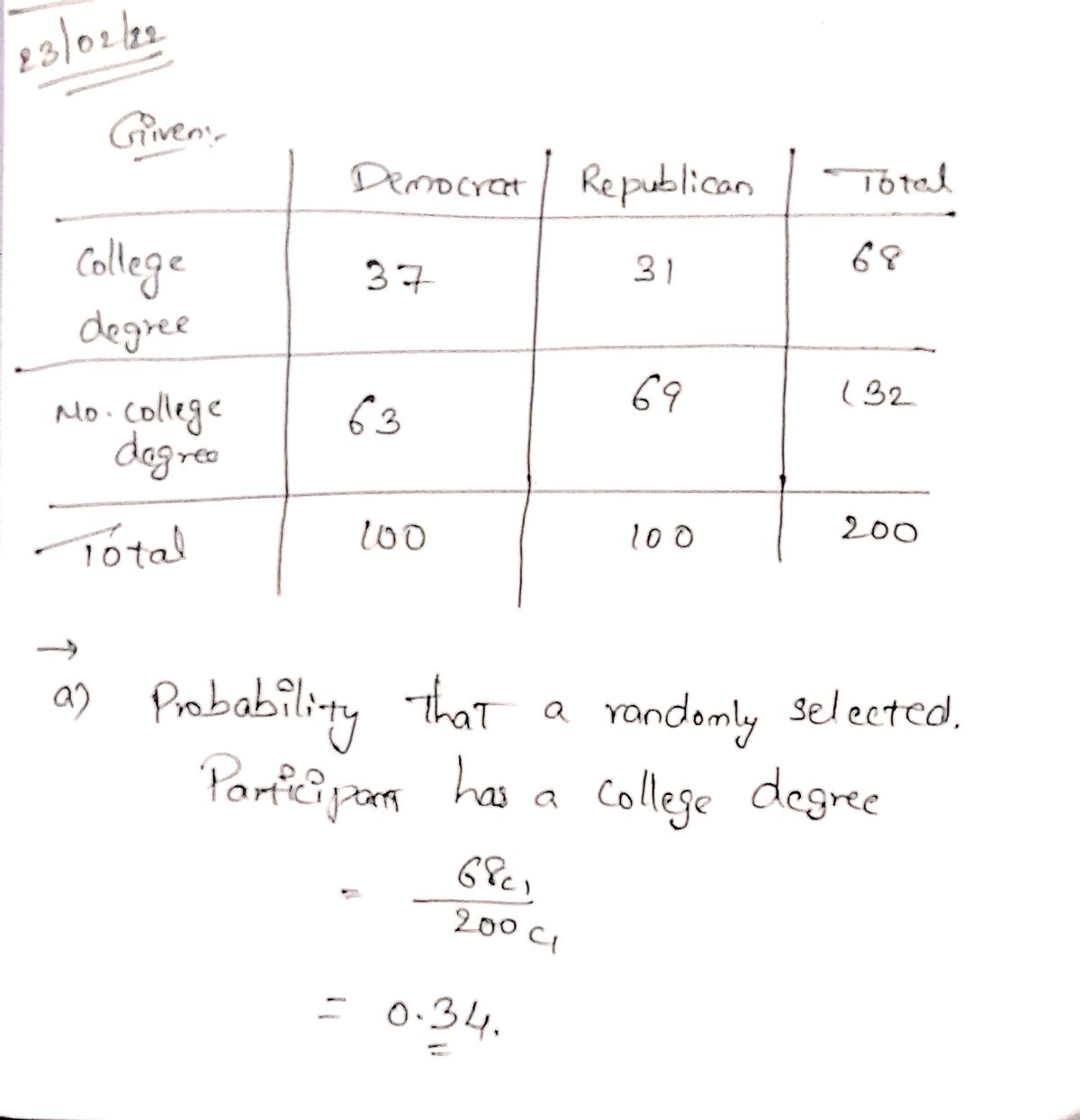51. The Pew Research Center finds that the demographic make-up of political parties is changing drastically through the election cycles. Consider the following summary of education levels among party lines. Democrat Republican Total College Degree No College Degree 37 31 68 63 69 132 Total 100 100 200 (a) What is the probability a randomly selected participant has a college degree? (b) What is the probability that a randomly selected participant is a democrat? (c) What is the probability that a randomly selected participant is a democrat and has a college degree? (d) Of those who have college degrees, what is the probability of being a democrat? (e) What is the probability of begin a democrat or having a college degree? (f) Are having a college degree and being a democrat disjoint events? (g) Are having a college degree and being a democrat independent events?
51. The Pew Research Center finds that the demographic make-up of political parties is changing drastically through the election cycles. Consider the following summary of education levels among party lines. Democrat Republican Total College Degree No College Degree 37 31 68 63 69 132 Total 100 100 200 (a) What is the probability a randomly selected participant has a college degree? (b) What is the probability that a randomly selected participant is a democrat? (c) What is the probability that a randomly selected participant is a democrat and has a college degree? (d) Of those who have college degrees, what is the probability of being a democrat? (e) What is the probability of begin a democrat or having a college degree? (f) Are having a college degree and being a democrat disjoint events? (g) Are having a college degree and being a democrat independent events?
MATLAB: An Introduction with Applications
6th Edition
ISBN:9781119256830
Author:Amos Gilat
Publisher:Amos Gilat
Chapter1: Starting With Matlab
Section: Chapter Questions
Problem 1P
Related questions
Question
i need help with a-c

Transcribed Image Text:51. The Pew Research Center finds that the demographic make-up of political parties is changing
drastically through the election cycles. Consider the following summary of education levels among
party lines.
Democrat Republican Total
College Degree
No College Degree
37
31
68
63
69
132
Total
100
100
200
(a) What is the probability a randomly selected participant has a college degree?
(b) What is the probability that a randomly selected participant is a democrat?
(c) What is the probability that a randomly selected participant is a democrat and has a college
degree?
(d) Of those who have college degrees, what is the probability of being a democrat?
(e) What is the probability of begin a democrat or having a college degree?
(f) Are having a college degree and being a democrat disjoint events?
(g) Are having a college degree and being a democrat independent events?
Expert Solution
Step 1

Step by step
Solved in 2 steps with 2 images

Recommended textbooks for you

MATLAB: An Introduction with Applications
Statistics
ISBN:
9781119256830
Author:
Amos Gilat
Publisher:
John Wiley & Sons Inc

Probability and Statistics for Engineering and th…
Statistics
ISBN:
9781305251809
Author:
Jay L. Devore
Publisher:
Cengage Learning

Statistics for The Behavioral Sciences (MindTap C…
Statistics
ISBN:
9781305504912
Author:
Frederick J Gravetter, Larry B. Wallnau
Publisher:
Cengage Learning

MATLAB: An Introduction with Applications
Statistics
ISBN:
9781119256830
Author:
Amos Gilat
Publisher:
John Wiley & Sons Inc

Probability and Statistics for Engineering and th…
Statistics
ISBN:
9781305251809
Author:
Jay L. Devore
Publisher:
Cengage Learning

Statistics for The Behavioral Sciences (MindTap C…
Statistics
ISBN:
9781305504912
Author:
Frederick J Gravetter, Larry B. Wallnau
Publisher:
Cengage Learning

Elementary Statistics: Picturing the World (7th E…
Statistics
ISBN:
9780134683416
Author:
Ron Larson, Betsy Farber
Publisher:
PEARSON

The Basic Practice of Statistics
Statistics
ISBN:
9781319042578
Author:
David S. Moore, William I. Notz, Michael A. Fligner
Publisher:
W. H. Freeman

Introduction to the Practice of Statistics
Statistics
ISBN:
9781319013387
Author:
David S. Moore, George P. McCabe, Bruce A. Craig
Publisher:
W. H. Freeman